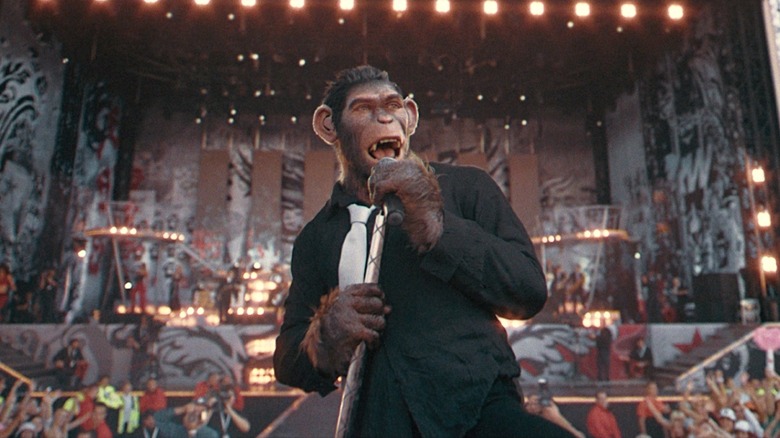
Paramount
It's the extravagant and gorgeously-shot musical that should've landed all the praise that "Wicked" received, the pull-no-punches biopic that took all the biggest risks "A Complete Unknown" carefully avoided, and the VFX-heavy blockbuster that, in a better world, would've landed an Oscar nomination for its monkey in the middle of the action right alongside "Kingdom of the Planet of the Apes." Instead of all that, "Better Man" must suffer the ignominy of becoming 2025's first and maybe biggest box office flop. Truly, may the film gods forgive us for what we've done.
It makes sense why "Better Man" didn't receive its just desserts the first time around (/Film's review by Jacob Hall makes a convincing case for it as "the strangest biopic ever made"), but that only makes its hidden joys even more worth celebrating. Can you count how many casual moviegoers know that the film about British pop star Robbie Williams doesn't shy away one bit from how much of an unlikable jerk he was in his mad scramble to make it to the top of the charts? How much awareness is there around the fact that the script provides no concrete explanation for why its lead character has been reimagined as a CGI ape (beyond a throwaway line early on implying that this is simply the way our self-loathing lead sees himself)?
Most importantly of all, were the masses aware that the climax of the film crescendos with as over-the-top a concert sequence as has ever been committed to the big screen — one that pits Robbie Williams against younger versions of himself in a psychedelic gladiatorial brawl for the ages?
Well, now you know, and once you finally check out this oddity of a movie (if you haven't already), I promise you'll be as obsessed as I was to find out everything there is to know about how 2024's wildest, most bonkers scene came to be.
Better Man director Michael Gracey names The Lord of the Rings, Game of Thrones, and more as inspirations
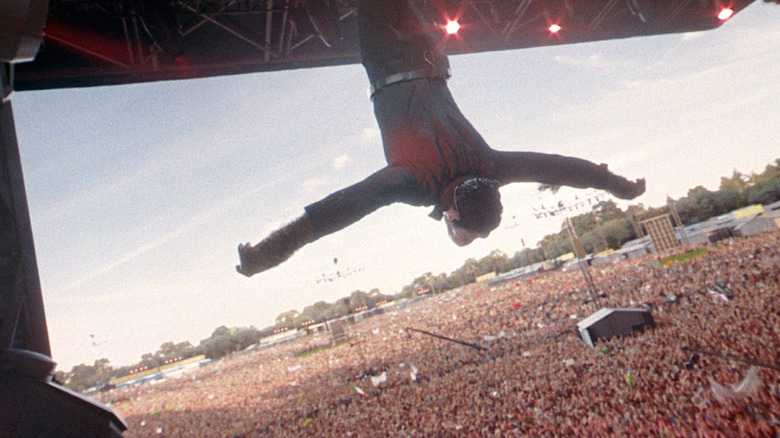
Paramount
If all of the above sounds like hyperbole, believe me when I say that it earns every single bit of hype. You may not come away from the biopic as in love with it as its biggest defenders are (present company very much included), but you will have little choice but to respect the sheer audacity on display. No scene sums that up better than what takes place during the film's undeniable high point. Throughout the film, the ape-ified Robbie Williams has been scratching and clawing his way to make it to what he considers the absolute top of the class: an invitation to perform at Knebworth, the open-air concert considered to be hallowed ground for our pals across the pond. It took until the clip of this sequence made its way online for everyone to marvel at just how far this biopic dares to go, but real ones knew well ahead of time that no scene better encapsulates the truth: There are movies that need to be seen to be believed, and then there's "Better Man."
The monkey fight sequence from the Robbie Williams biopic 'BETTER MAN' has been released online.
Read our ⭐️⭐️⭐️⭐️⭐️ review: https://t.co/BdJZpYButH pic.twitter.com/24gfB4bRvm
— DiscussingFilm (@DiscussingFilm) February 10, 2025
In a recent interview timed to the movie's home video release, "Better Man" director Michael Gracey spoke to /Film about how this madcap sequence came to be and, more specifically, the three main sources of inspiration that helped fuel what the Knebworth Festival battle would eventually become. Two of them may be fairly obvious – yes, "The Lord of the Rings" and the Battle of the Bastards sequence in "Game of Thrones" clearly left their marks — but we guarantee you'll never guess the other one. Gracey explained that he was chasing the highs of an obscure French film ... while also teasing that there's more to the fight that we didn't get to see:
"There's a film called 'Queen Margot' — 'Le Reine Margot' — which is a French film, and the reason I love the sword fights in that is that there's a weight to the sword, and they're fighting so long that there's real fatigue. By the end, [the protagonist is] with this guy and he can't even lift his sword to strike him. It just felt so dirty and so visceral, and I referenced that a lot. I had to cut the [Knebworth] sequence down, because I really wanted to give it a sense of that, the weight of the sword and everything, but it was just running a bit long. So I didn't get to play out that idea as much as I initially planned and initially choreographed for."
A Better Man's Knebworth concert is also a commentary on rehab therapy
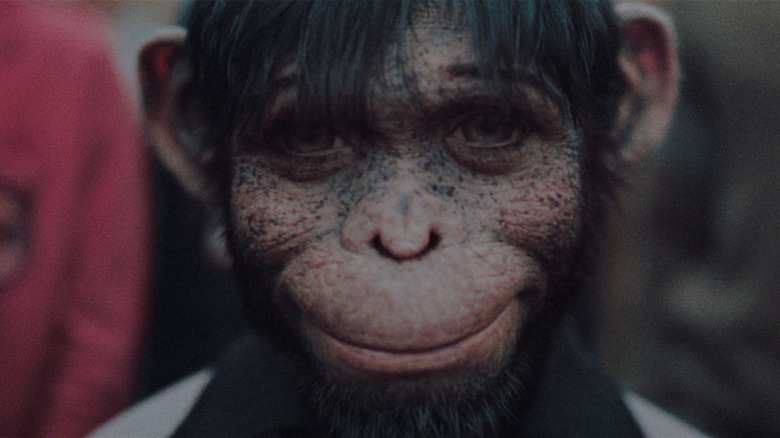
Paramount
Lest anyone come away from this thinking that "Better Man" is all about the lurid spectacle of a famous figure's fall from grace, I assure you that's only the half of it. The biopic is even more interested in Robbie Williams' famous comeback, turning his life and his career around over the course of several years — not necessarily through willpower alone, but by the healing and redemptive power of rehab. For director Michael Gracey, that played a fairly significant role in what goes down during the Knebworth Festival mayhem:
"The idea of fighting yourself is something I think we're all familiar with, and you get an idea of that self-loathing and that self-judgement going through every performance that he does. He's always clocking himself out in the audience, looking out in disgust. So it reaches this point at Knebworth, because you go, in your head, 'Oh, this is obviously this guy's greatest moment of his life. He's performing to 125,000 people, he did it three nights in a row, he broke every record at the time.' You're just like, this is what you think is someone's greatest moment of happiness where he's fulfilling all his dreams. And yet, at the time, it was an absolute nightmare. Robbie doesn't remember that performance at all, which, to me, speaks to how checked out he was, mentally. That's incredible, to have one of the greatest moments you could ever experience and not remember it."
Where "Better Man" shines the most is in its depiction of a concert that starts out lively and fun ... only to devolve into a harrowing battle in Robbie Williams' mind, culminating in a dark moment where he gruesomely slays an attacker revealed to be himself as a kid. For Gracey, that sudden low point had its roots in a real-world therapeutic approach for those in rehab. As he explained:
"And then obviously it comes to quite an abrupt halt when he kills his younger self, which is based on going to rehab and one of the techniques where they show you a photo of your younger self at age five or six, and basically say, 'Would you be doing what you're doing to yourself to this little boy?' And of course people are like, 'No, I freaking love that kid. As if I would do this to that boy.' And they're like, 'Well, that's you.'"
You can hear Jacob Hall's full interview with Gracey in the back half of today's episode of the /Film Daily podcast:
You can subscribe to /Film Daily on Apple Podcasts, Overcast, Spotify, or wherever you get your podcasts, and send your feedback, questions, comments, concerns, and mailbag topics to us at [email protected]. Please leave your name and general geographic location in case we mention your e-mail on the air.





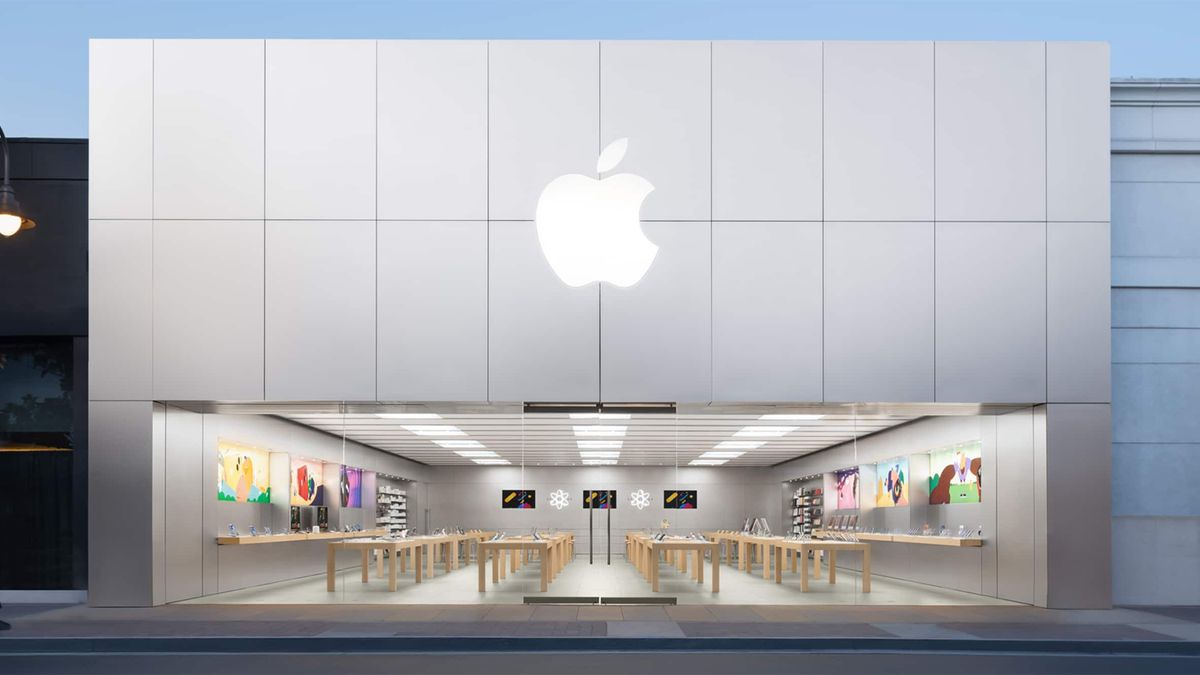


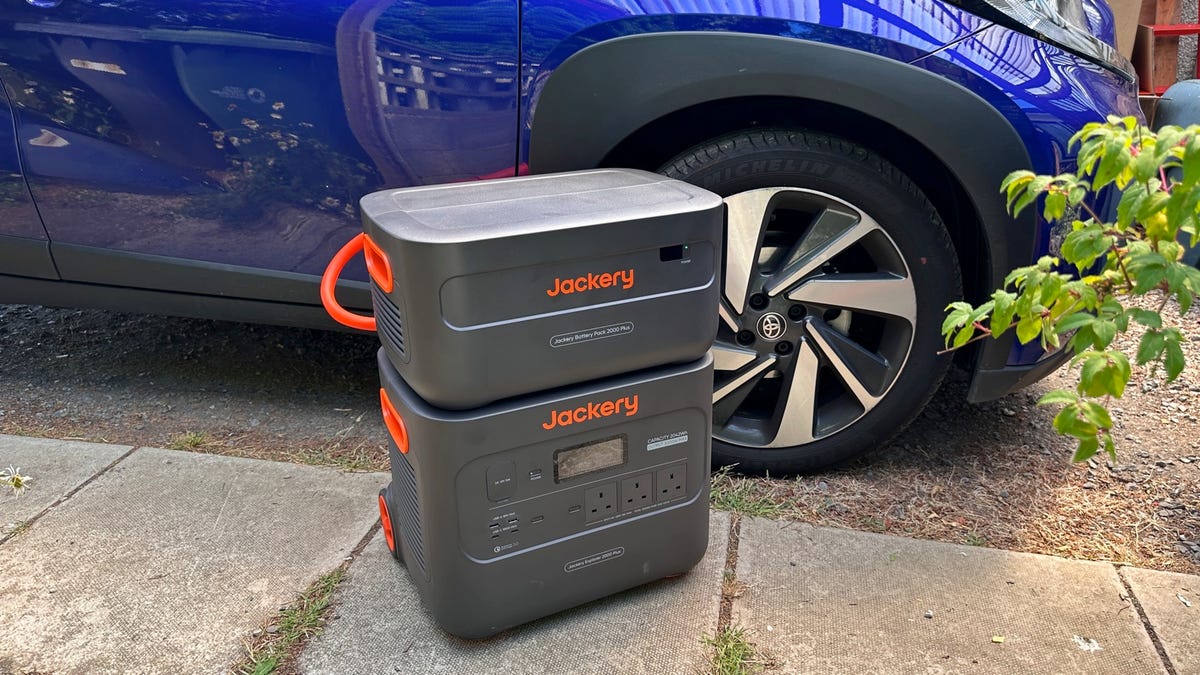
 English (US) ·
English (US) ·